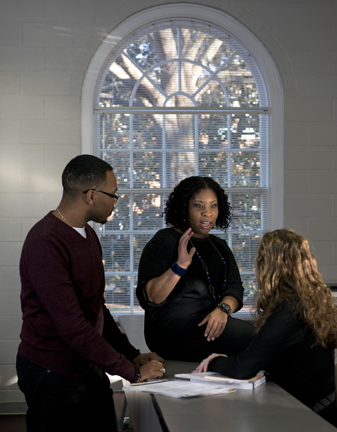By Benjamin Gleisser
Black women make up 13 percent of the population of women in the United States, but when it comes to new HIV infection cases, says Buffie Longmire-Avital ’02, “they account for about 66 percent of all women who contract HIV.”

Buffie Longmire-Avital ’02 talks with Demarius Hunt and Victoria Bell, Elon University students. Photo by Kim Walker.
Longmire-Avital, assistant professor of psychology at Elon University, is conducting research on why so many young black women are contracting HIV/AIDS. She was shocked by the statistic that 1 in 33 black women is likely to be infected by HIV at some point in her lifetime.
The work is important, she says, because previous studies have only examined behavior of high-risk groups often associated with the spread of HIV, such as intravenous drug users and sex workers. She is researching seemingly lower-risk groups—college-educated and upwardly mobile young adults—who believe they don’t have a high risk because they don’t engage in the highest-risk behavior.
After extensive surveys, Longmire-Avital has found that “women don’t want to say, ‘show me your health test’ when in a non-serious relationship because they’re afraid of insinuating that their partner socializes with high-risk individuals.” They may use condoms, but they will not know the HIV status of their partner.
“They are still taking a risk,” she says.
Other research
A psychology graduate, Longmire-Avital conducted her first research at Lafayette as an EXCEL Scholar, examining the impact of stereotypes on the academic performance of different genders and ethnic groups.
She also investigates the effect of stress on black Americans. This involves teaching meditation and other stress-reducing techniques to help black youths process and eliminate societal pressures so they can live healthier lives.
Her co-authored article on how religious faith affects lesbian, gay, and bisexual black young adults appeared in Developmental Psychology (December 2012).
Early interest in science
As a child, Longmire-Avital left experiments in the refrigerator.
“Our family was fairly poor but my mother was a champion of education and somehow found a way to buy a microscope for me,” she says.
In junior high, her goal was to become a brain surgeon, but one day in the library, she discovered books by Sigmund Freud and Carl Jung.
“While everyone else was growing mold on bread for their science project, I was examining how different types of music affected people’s moods,” she says. “I was a nerdy kid, and I wore it with a badge of honor.”
At Lafayette, her photo exhibit, Every Black Woman Owns an Umbrella—a study of how black women relate to their hair—was showcased at Portlock Black Cultural Center.
“[Art professor Curlee Holton] offered unconditional support and understood what it was to be a student of color,” Longmire-Avital says. “By allowing me to explore my artistic side, he reminded me that it was important to have balance in my life. And he offered me many words of wisdom.”
